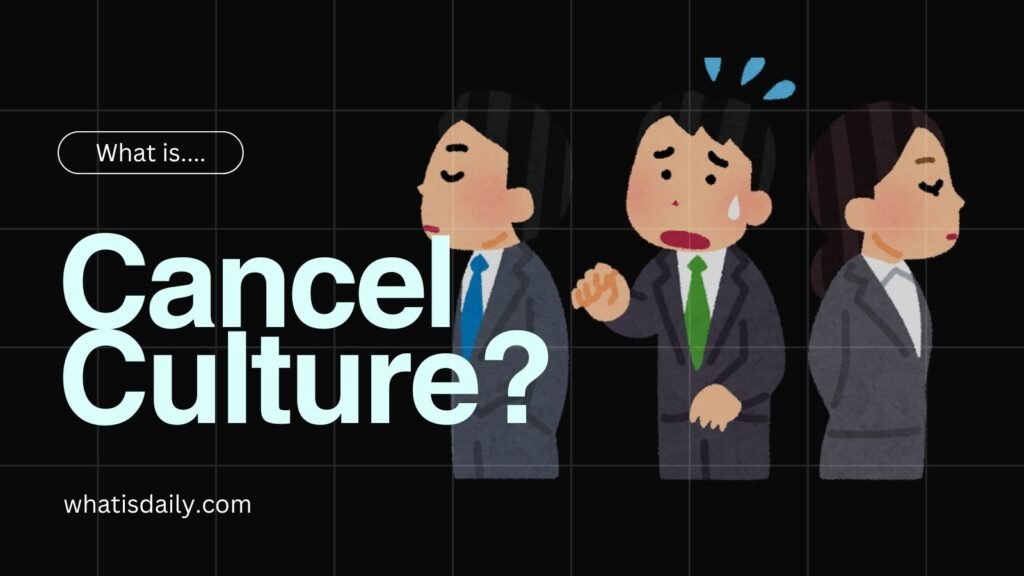Cancel culture is the practice of withdrawing support or calling out public figures, brands, or even everyday people when they are perceived to have acted offensively or unethically. In recent years, it has become one of the most hotly debated social phenomena, sparking conversations about accountability, freedom of expression, and the power of collective voices. Understanding cancel culture is crucial in today’s digital age because it directly shapes how society navigates morality, justice, and even everyday behavior.
What Is Cancel Culture and Why It Sparks Debate
The term “cancel culture” refers to a modern form of public shaming where individuals or organizations face backlash, boycotts, or reputational consequences due to perceived wrongdoing. This often happens on social media platforms where issues spread rapidly, giving ordinary people the ability to collectively voice disapproval. In some cases, celebrities, companies, and influencers have seen careers stall or even collapse after being “canceled.”
What makes cancel culture such a divisive topic is its complicated nature. For some, it is viewed as a tool of social justice, ensuring that powerful people cannot act without consequence. For others, it resembles a digital mob mentality, where mistakes—whether big or small—are amplified, leaving no room for nuance, forgiveness, or growth. This tension is why debates around cancel culture are so heated.
To make sense of it, imagine cancel culture as both a loud protest and a whisper network. It is like when a consumer warns their friends about a bad restaurant experience, but amplified to the world stage. Once that whisper becomes viral online, it can damage reputations permanently. This duality—helping some voices be heard while sometimes silencing others—is at the heart of why cancel culture divides opinion.
How Cancel Culture Influences Society and Behavior
Cancel culture influences not just celebrities but everyday people and even businesses. Someone posting an offensive comment on Twitter years ago may face consequences today, while companies that make poor ethical choices often see boycotts trending online. These examples show how both personal responsibility and corporate accountability have shifted under the pressure of public opinion.
On the societal level, cancel culture has forced people to think more carefully about their words and actions. Whether sharing a joke at work or posting on Instagram, many now consider how what they say could be perceived. In one sense, this can encourage sensitivity and inclusivity. On the other hand, it can also discourage open dialogue, where people fear speaking out not because they are wrong but because they are worried about being misunderstood.
The ripple effect of cancel culture becomes evident in cultural trends and public policy. Conversations around racism, sexism, and systemic injustice have gained traction partly due to collective digital accountability. At the same time, organizations and schools have changed their policies to appear more responsible and inclusive. This shows how online behavior can reshape offline systems, much like protests on the street influence changes in laws and institutions.
Power of Social Media in Cancel Culture
The role of social media cannot be overstated when it comes to cancel culture. Platforms like Twitter, Instagram, and TikTok are where movements both start and spread. A single screenshot, repost, or video clip can reach millions within hours, essentially acting as the modern courtroom of public opinion.
Social media gives people a voice they may never have had otherwise. For marginalized communities, it feels like a much-needed megaphone, highlighting injustices that traditional media often ignored. However, that same megaphone can be misused, with misinformation spreading just as quickly as genuine grievances. Once a narrative takes hold, it is often difficult to correct or reverse.
Think of cancel culture online like wildfire. It can start with a small spark—one tweet or post—and quickly burst into a full blaze. Sometimes that fire exposes long-standing problems that need attention, but other times it burns out of control, engulfing someone before the full story is even known.
Benefits and Criticisms of Cancel Culture
One of the main benefits of cancel culture is holding people accountable for harmful actions. Without it, many public figures might continue without consequence. For example, multiple companies such as Starbucks have had to confront issues of racial bias or workplace problems after receiving online pressure. Accountability, in this way, can bring forth real change.
Despite this, critics argue cancel culture often lacks fairness. People can get “canceled” for minor mistakes, old posts, or even false accusations. Unlike a court system with evidence and trials, cancel culture judgment is often instant, emotional, and unforgiving. This leads some to feel it encourages conformity rather than healthy debate.
Another criticism centers around the idea of growth and redemption. If someone apologizes and tries to change, should they be allowed to rebuild their reputation? Cancel culture often struggles with this gray area, leading to an environment where mistakes feel final, rather than opportunities for learning.
Everyday Impact of Cancel Culture
Cancel culture does not only affect celebrities; it also impacts regular daily life. Job seekers are more aware than ever that employers may search their digital history, making people cautious about old posts. College students, teachers, and even small business owners have faced backlash after controversial statements came to light.
This sense of caution can foster responsibility, but it can also stifle authentic expression. People sometimes feel they need to curate a “perfect” online image, avoiding humor or casual statements for fear of being misunderstood later. It makes everyday communication more strategic, like walking on a social tightrope.
Additionally, cancel culture has shaped consumer habits. Many choose to spend money based on values, boycotting brands that fail to align with their beliefs. This consumer-driven form of accountability has the potential to create positive change but also raises questions about whose values dominate and whether all perspectives are heard.
Finding Balance Between Accountability and Forgiveness
The central question society faces is how to balance accountability with empathy. Cancel culture demands people take responsibility, but it rarely allows them to show growth. A healthier approach could involve consequences that fit the offense, while still giving room for understanding and change.
This balance requires nuance, something often missing from social media debates. For instance, there is a big difference between someone intentionally spreading hate and someone who made a thoughtless comment years ago. Treating these scenarios the same way leads to unfair outcomes and further polarization.
Finding that middle ground may involve slowing down responses, listening to different perspectives, and allowing opportunities for redemption. Much like in everyday friendships, people deserve both honesty and compassion when they make mistakes. Without that balance, society risks becoming more judgmental than just.
Quick Takeaways
- Cancel culture is a modern form of accountability that often plays out on social media.
- It can be positive by amplifying marginalized voices and exposing harmful behavior.
- At the same time, it can create fear, stifle free expression, and overlook opportunities for growth.
FAQs
What is cancel culture in simple terms?
Cancel culture is when individuals or groups stop supporting someone—like a celebrity, influencer, or brand—because of offensive words or actions, often making this decision publicly known on platforms like Twitter or Instagram.
What is the impact of cancel culture on freedom of speech?
Cancel culture can encourage mindful communication, but some argue it also discourages open dialogue because people fear being “canceled” for unpopular opinions.
How does cancel culture affect young people?
Young people often feel pressured to maintain a spotless online image, which can increase anxiety but also foster awareness of inclusivity and respect in digital spaces.
Cancel culture reflects the digital age we live in—a time when individuals can hold powerful voices accountable but also risk creating an unforgiving environment. It shapes how we speak, behave, and even shop, leaving behind a complex legacy of both empowerment and caution. As society continues to debate its role, the challenge remains in finding the right balance between justice and compassion. For more thought-provoking insights on cultural shifts and digital trends, check out other articles at What Is Daily.


